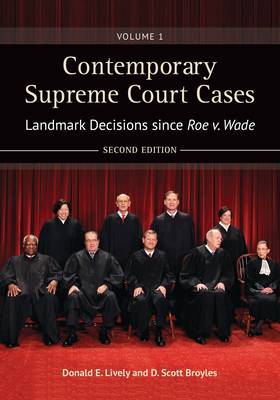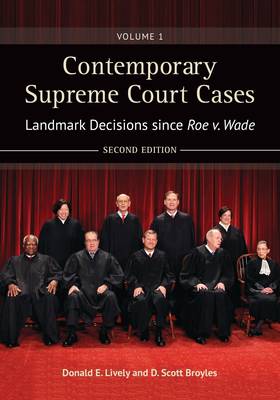
- Retrait gratuit dans votre magasin Club
- 7.000.000 titres dans notre catalogue
- Payer en toute sécurité
- Toujours un magasin près de chez vous
- Retrait gratuit dans votre magasin Club
- 7.000.0000 titres dans notre catalogue
- Payer en toute sécurité
- Toujours un magasin près de chez vous
Contemporary Supreme Court Cases
Landmark Decisions Since Roe V. Wade [2 Volumes]
Donald E Lively, D Scott BroylesDescription
As the nation's law defines society, society defines the law. As the nation's fundamental law, the U.S. Constitution is the overarching statement of the people's will. Interpreting the Constitution, however, is no simple task. This book examines more than 100 landmark Supreme Court cases from 1973 to the present, providing readers with insights into decisions that have had a profound impact on American politics, commerce, culture, and life.
Organized categorically, this book serves readers either as a comprehensive review of modern constitutional law or as a ready reference source. It includes entries on Supreme Court decision-making regarding high-interest issues such as abortion (Roe v. Wade, 1973; Gonzales v. Carthart, 2007), climate change (Massachusetts v. EPA, 2007), voting rights (Bush v. Gore, 2000), free speech (Texas v. Johnson, 1989), the death penalty (Roper v. Simmons, 2005), immigration (Arizona v. United States, 2012), campaign financing (Citizens United v. FEC, 2010), gun control (District of Columbia v. Heller, 2008), the Affordable Care Act (National Federation of Independent Business v. Sebelius, 2012), and gay marriage (United States v. Windsor, 2013).
The book not only interprets key Court decisions but also provides critical context and perspective that makes the subject matter easier to understand and more meaningful, especially for readers without an extensive background in Constitutional law. Bibliographies are provided at the end of each case to direct those seeking to delve more deeply into specific topics.
Spécifications
Parties prenantes
- Auteur(s) :
- Editeur:
Contenu
- Nombre de pages :
- 792
- Langue:
- Anglais
Caractéristiques
- EAN:
- 9781440837128
- Date de parution :
- 22-02-16
- Format:
- Livre relié
- Format numérique:
- Met stofomslag
- Dimensions :
- 185 mm x 262 mm
- Poids :
- 2086 g

Les avis
Nous publions uniquement les avis qui respectent les conditions requises. Consultez nos conditions pour les avis.






